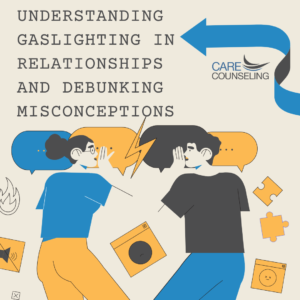 Gaslighting, a term derived from a classic 1944 film, has gained significant recognition in recent years. It refers to a form of emotional manipulation that erodes an individual’s sense of reality, making them doubt their own perceptions and experiences. While gaslighting is often associated with toxic relationships, it is crucial to understand what gaslighting truly is and dispel misconceptions that can cloud our understanding. In this blog post, we will explore the depths of gaslighting, its impact on relationships, and debunk some common myths surrounding this insidious form of manipulation.
Gaslighting, a term derived from a classic 1944 film, has gained significant recognition in recent years. It refers to a form of emotional manipulation that erodes an individual’s sense of reality, making them doubt their own perceptions and experiences. While gaslighting is often associated with toxic relationships, it is crucial to understand what gaslighting truly is and dispel misconceptions that can cloud our understanding. In this blog post, we will explore the depths of gaslighting, its impact on relationships, and debunk some common myths surrounding this insidious form of manipulation.
Understanding Gaslighting
Gaslighting involves a deliberate pattern of psychological manipulation aimed at undermining a person’s self-confidence and autonomy. The gaslighter seeks to gain power and control over their victim by distorting their reality, making them question their sanity and memory. This form of emotional abuse can occur in various types of relationships, including romantic partnerships, family dynamics, and professional settings.
Gaslighting Tactics
Gaslighting tactics can manifest in subtle ways, making it difficult for victims to recognize and address the manipulation. Here are some common tactics employed by gaslighters:
- Denial and Deception: The gaslighter denies events or occurrences that the victim clearly remembers, leading to confusion and self-doubt.
- Discrediting and Diminishing: Gaslighters belittle the victim’s achievements, emotions, or opinions, making them feel inadequate and unworthy.
- Diverting and Deflecting: Gaslighters redirect conversations, shifting blame onto the victim or introducing unrelated topics to distract from their behavior.
- Withholding Information: By deliberately withholding important information, gaslighters create a power imbalance, leaving the victim feeling uninformed and dependent on the manipulator.
Debunking Misconceptions about Gaslighting
It is essential to debunk some misconceptions about gaslighting to foster a clearer understanding of this manipulative tactic:
- Gaslighting is not a result of occasional misunderstandings: Gaslighting is not about honest mistakes or disagreements. It is a calculated and consistent pattern of psychological manipulation designed to control and dominate the victim.
- Gaslighting is not limited to romantic relationships: While gaslighting is often associated with romantic partnerships, it can occur in any relationship dynamic, including friendships, family, and professional environments.
- Gaslighting is not solely about lying: Gaslighting involves more than simple dishonesty. It encompasses a range of tactics aimed at distorting the victim’s perception of reality, ultimately undermining their confidence and autonomy.
- Gaslighting is not the victim’s fault: Gaslighting is solely the responsibility of the gaslighter. No one deserves to be manipulated or emotionally abused, regardless of their actions or vulnerabilities.
Recognizing and Addressing Gaslighting
Recognizing gaslighting is the first step towards breaking free from its grip. If you suspect you are a victim of gaslighting, consider the following steps:
- Educate yourself: Learn about gaslighting and its tactics to better understand what you are experiencing.
- Trust your instincts: Acknowledge your feelings and trust your perception of reality.
- Seek support: Reach out to trusted friends, family members, or professionals who can provide validation and guidance.
- Set boundaries: Establish clear boundaries and communicate them assertively with the gaslighter.
- Prioritize self-care: Focus on activities that promote self-esteem, self-compassion, and emotional well-being.
We’re Here to help
Our wellness experts will be happy to take care of you. You can CLICK HERE to schedule an appointment now or call (612)223-8898.
Meet Clinicians
We’re united by our commitment to providing effective, relevant, and innovative mental health support at all stages of your journey. Click Here to find a therapist or find out more about who we are, where we come from, and how we live out CARE’s mission every day.
The professionals at CARE are actively collecting and creating resources to help with what you need and address frequently asked questions. We’re Here for You.



